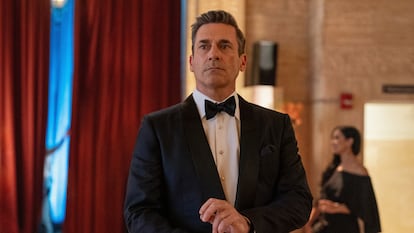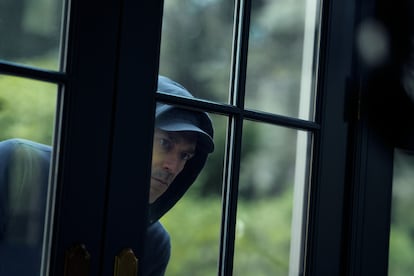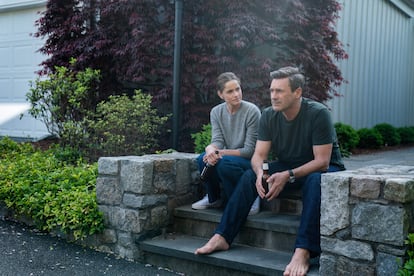Jon Hamm: ‘I don’t think very much about Don Draper’
The ‘Mad Men’ actor returns to a starring role with ‘Your Friends and Neighbors,’ a show about the miseries of the rich. ‘There’s something about slyly judging them that makes you feel better,’ he says

Since Mad Men ended a decade ago, Jon Hamm, 54, has largely taken on supporting roles — some as juicy as the villain in season five of Fargo, or the tech mogul in season three of The Morning Show. But with Your Friends and Neighbors (premiering Friday, April 11 on Apple TV+), he’s stepping back into the spotlight.
“I’ve had my fair share of things that have come my way. But for one reason or another, they haven’t felt like the right choice. Still, I’ve stayed fairly busy,” he says.
Now, he’s realizing that leading a series in your fifties isn’t quite the same as doing it in your thirties, back when he first embodied the iconic ad man Don Draper.
“From an energy standpoint, it’s just the sheer workload... It’s a lot harder to do in your mid-fifties than it was to do in your mid-thirties. I was talking with a couple friends of mine who are also leads on television shows. And I was like, ‘this is a lot harder now.’ But it’s still very fulfilling. I enjoy being the lead of the show. I enjoy all of the work and the responsibility. It’s what I do. I like to think I’m pretty good at it,” he told EL PAÍS over a video call on the last day of March.
It’s fitting that the man who brought Don Draper to life is now playing Coop, the lead in Your Friends and Neighbors. Andrew Cooper — known simply as Coop — is a self-made man who’s climbed the social ladder to achieve the American dream: a sprawling single-family home, a luxury car, the picture-perfect family, and a prestigious job.
But everything comes crashing down when his wife cheats on him with his best friend and he’s fired from his job. Unlike Don Draper, who plummets from a skyscraper in the iconic Mad Men opening, Coop refuses to fall. Instead, he clings to the life he once had — by stealing from the lavish homes of his friends and neighbors. He’s the perfect man for the job. He knows their routines, their secrets, where they keep their best watches and which valuables they won’t miss, and he can sell on the black market. Naturally, things spiral from there.

In Your Friends and Neighbors, creator Jonathan Tropper wanted to examine the world of wealth and privilege — a world he’s known intimately since childhood. It’s not an unfamiliar environment for Hamm, either.
“I grew up around a similar neighborhood like this. I wasn’t really part of it, but it was where I grew up,” he explains. “I was on the outside looking in and the country clubs and all of that stuff was very foreign to me personally, but I was friends with a lot of people that lived that life. There are a lot of similarities even with how it was in the 1980s, when I grew up, to now. It’s a very rich playground to set this story in. There is something very thrilling to looking at this tremendously privileged group of people and seeing that they’re not exactly happy either. Just like us.”
The series gives Hamm the chance to flex his range as an actor: he moves from deeply dramatic moments to the more comedic and ironic side that he exploits wherever possible. He’s joined along the way by actresses Amanda Peet and Olivia Munn, both of whom are already well-versed in navigating these two sides. This peculiar tone helps the show carve out its place in one of today’s most popular television subgenres: exploring the miseries of the rich.
“There’s something about watching them and slyly judging them that makes you feel better, seeing those people who, quote unquote, have everything and yet are still miserable. You can go, ‘Ha ha, look at those poor dummies.’ But at the same time, there’s something very aspirational about watching both this show and The White Lotus. I think people watch these shows and go, ‘well, if I had all that stuff and if I had all that money, I wouldn’t be like that,‘” Hamm reflects.

It’s inevitable to draw comparisons between Don Draper and Coop — two men from different eras who nonetheless occupy privileged positions and command a certain social polish. Hamm seems to have an answer ready when asked about the similarities between the two characters.
“They do look alike. That’s true,” he laughs. “They’re both deeply involved with what we used to say was the American dream. But whereas Don is selling it, Coop is buying it. They’re both making their peace with the fact that they seemingly have achieved what they were meant to achieve, and yet there is a hollowness to it, not quite the sense of fulfillment they thought they were going to find. With Don, all of that was like a house of cards because it was built on truly false and dishonest foundations. And with Coop, I think it’s a little more of a sense of: ‘Is that all there is? What’s really meaningful?’ And that’s an interesting question to ask: what is the end of all this work? Is it to accumulate things that ultimately don’t have meaning and end up in a landfill, or to accumulate more meaningful yet ethereal things, like relationships, family, or a legacy?” the actor reflects.
Hamm is well aware that he owes a lot of his success to Mad Men. “It’s certainly the very first thing that was significant and meaningful in my career. And it had such a cultural impact. I will always be connected to it,” he says of the Matthew Weiner-created drama, for which he won the Emmy Award for Best Actor after eight nominations for the same role.
“The show stands the test of time; it’s still wonderful, and there’s a lot you can get by rewatching it. A lot of people have told me they’ve started showing it to their kids, who are grown up enough now. Another generation is discovering it, and that means a lot to me because it means I’ve made something that people are continuing to enjoy.”

But Don Draper’s shadow looms large, and even now, as the 10th anniversary of the series finale approaches, Hamm continues to field questions about the world of Mad Men. Is it difficult to shake off Don Draper?
“It gets easier with time. It’s been 10 years since we finished the show, 20 years from the beginning of shooting, in 2005. That’s a lot of time. I don’t think about Don Draper very much, but I’m happy to talk about him with people who do. It remains a wonderful time in my life, but it’s a time in my life that was quite a long time ago,” he replies, seemingly at peace with the idea that Draper may follow him for a while longer. Possibly, for life.
Sign up for our weekly newsletter to get more English-language news coverage from EL PAÍS USA Edition
Tu suscripción se está usando en otro dispositivo
¿Quieres añadir otro usuario a tu suscripción?
Si continúas leyendo en este dispositivo, no se podrá leer en el otro.
FlechaTu suscripción se está usando en otro dispositivo y solo puedes acceder a EL PAÍS desde un dispositivo a la vez.
Si quieres compartir tu cuenta, cambia tu suscripción a la modalidad Premium, así podrás añadir otro usuario. Cada uno accederá con su propia cuenta de email, lo que os permitirá personalizar vuestra experiencia en EL PAÍS.
¿Tienes una suscripción de empresa? Accede aquí para contratar más cuentas.
En el caso de no saber quién está usando tu cuenta, te recomendamos cambiar tu contraseña aquí.
Si decides continuar compartiendo tu cuenta, este mensaje se mostrará en tu dispositivo y en el de la otra persona que está usando tu cuenta de forma indefinida, afectando a tu experiencia de lectura. Puedes consultar aquí los términos y condiciones de la suscripción digital.









































